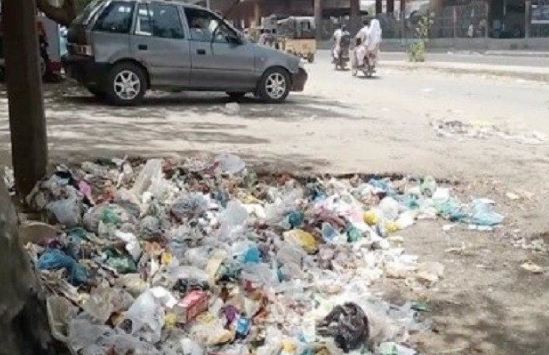Like many developing nations, Pakistan has a difficult time controlling its solid waste

Hammad Khan
Like many developing nations, Pakistan has a difficult time controlling its solid waste. The amount of garbage produced has increased to dangerous proportions as a result of increasing urbanisation, population development, and shifting consumer habits. Effective solid waste management has thus become a critical issue that needs prompt attention and long-term solutions.
Any substance that has been wasted is referred to as solid waste, which includes commercial, industrial, and residential garbage. The improper handling of this waste not only endangers the environment but also has an impact on people’s health and well-being. Poor infrastructure, lack of resources, and lack of awareness have added to the problem. The streets, open spaces, and water bodies are filled with solid waste,
The absence of an integrated strategy is one of the major problems with solid waste management. Since several departments and agencies are responsible for different aspects of waste management, there is a lack of coordination and cooperation. A thorough and coordinated strategy including all stakeholders, including governmental organisations, regional communities, and the private sector, is necessary to solve this problem.
Effective waste management is reliant on proper garbage collection and disposal. Pakistan must make investments in cutting-edge waste collecting techniques including door-to-door pickup, neighborhood trash cans, and waste sorting at the source. This would promote recycling and the recovery of priceless resources in addition to improving the effectiveness of garbage collection.
Another critical component of solid waste management is encouraging recycling and trash reduction programmes. Recycling may help save precious resources and cut down on the amount of garbage that is dumped in landfills. A more sustainable waste management system may be achieved through establishing recycling facilities, encouraging recycling practises in communities, and including recycling teaching in schools.
Moreover, it is crucial for the effectiveness of waste management operations to increase public awareness and promote behavioural change. Programmes for community involvement, public awareness campaigns, and educational activities may all make a big difference in encouraging people to dispose of their garbage properly, prevent littering, and feel more environmentally conscious.
The establishment of efficient waste management and elimination facilities is crucial in addition to these efforts. The negative environmental impact of trash may be reduced and renewable energy or organic fertilisers can be produced with the aid of composting facilities, waste-to-energy conversion plants, and landfill management practises.
The government must prioritise solid waste management and set forth the funds to deal with this urgent issue. In order to stimulate the development of waste management infrastructure, deter investments in unlawful dumping, and enforce fines for littering, policies and laws should be developed.
Although there are considerable problems with solid waste management in Pakistan, they may be solved with cooperation and a dedication to sustainable practices. Pakistan may make major strides towards a cleaner and healthier environment by developing integrated waste management systems, encouraging recycling and trash reduction, increasing public awareness, and investing in infrastructure.
In conclusion, Pakistan’s solid waste management needs urgent attention and long-term solutions. Prioritising garbage collection, recycling, and public awareness programmes while utilising an integrated strategy including all stakeholders is crucial. Pakistan can overcome the obstacles and provide its residents with a cleaner and healthier environment by working together and committing to sustainable practices.
Related News

Islam in the Hands of White Women and Men
By Qamar Bashir Since my early youth, I have firmly believed that Islam is notRead More

Government Employees and Tax Collection
by Muhammad Mohsin Iqbal Tax collection has always been an indispensable pillar in the architectureRead More


Comments are Closed